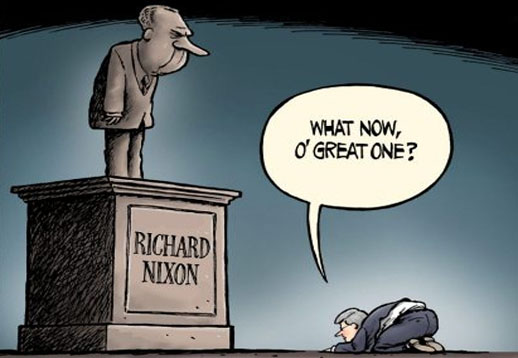
In less than 24 hours from now — on Monday, October 19th — Canadian voters will head to the polls to elect a new federal government in Ottawa.
As a service to VanRamblings’ readers, we will today present a précis of a trenchant, first rate article published in The Guardian, written by British investigative journalist & documentary maker, Nick Davies, who in autumn 2010 broke Britain’s News of the World phone hacking scandal, and wrote the book, Hack Attack: How the Truth Caught Up with Rupert Murdoch.
The Guardian article on Canada’s election is titled Stephen Harper: master manipulator. Davies asks the question, “Despite several scandals worthy of Watergate over the past decade, Stephen Harper could win a fourth election October 19th. Can the master manipulator work his dark magic?”
Davies goes on to compare Stephen Harper’s politics of manipulation to those of discredited U.S. president Richard “Tricky Dick” Nixon, writing …
“In the Watergate scandal, all the president’s men were accused primarily of breaking the law to get Nixon a second term in the White House. In Canada, some of the prime minister’s men and women have been accused not simply of cheating to win elections but of conspiring to jam the machinery of democratic government.”
“Some of these allegations have been proved.”
“In the 11 years since he became leader of Canada’s Conservative Party, the party has been fined for breaking electoral rules, and various members of Team Harper have been caught misleading parliament, gagging civil servants, subverting parliamentary committees, gagging scientists, harassing the Supreme Court, gagging diplomats, lying to the public, concealing evidence of potential crime, spying on opponents, bullying and smearing. Harper personally has earned himself the rare rebuke of being found to be in contempt of his Parliament.”
“At heart, Harper’s team are not that different from politicians across the developed world who have discovered that democracy is a pretty sweet theory but that, in reality, if you want to get hold of power and use it, there are all kinds of devious moves available that have very little to do with that antique idea.”
Davies writes that the path to electoral crime is rarely trodden but that there is a close alternative, what Nixon’s people called ratfucking — acts of sabotage to damage an opponent. Not exactly criminal. Not always.
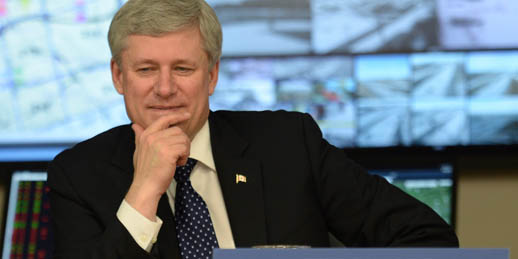
For example, when the current Liberal leader, Justin Trudeau, recently held an open-air press conference in Ottawa — as has been the case this past week, wherever Trudeau held a rally — he found himself being heckled by a group of young protesters waving placards. The Huffington Post revealed that these hecklers were interns working for the Prime Minister’s Office.
In his October 15th article in The Guardian, Davies expands on the idea …
“In the fortnight before polling day in 2011, Liberal supporters started receiving nuisance calls from people who claimed to be Liberal party workers – calling Jewish voters on the Sabbath, waking up others in the middle of the night. Liberals said this was Conservatives trying to alienate their support. Then, in the final three days before the vote, Elections Canada received a series of complaints about robocalls — recorded messages sent by automatic dialing — that told voters quite falsely that their polling station had been moved.”
“By election day, anxiety was rising among officials, as internal emails recorded: ‘It seems that Conservative candidates are pretending that Elections Canada or returning officers have changed the polling stations … They have actually disrupted the voting process … It’s right across the country except Saskatchewan … It appears it is getting worse.’ This looked like a national campaign to suppress the Liberal vote by scattering it away from the polling booths.”
When a group of voters from the six affected Ontario ridings went to federal court to challenge the results of the election, Mr Justice Mosley issued a devastating verdict, stating …
“I am satisfied that it has been established that misleading calls about the locations of polling stations were made to electors in ridings across the country and that the purpose of those calls was to suppress the votes of electors who had indicated their preference in response to earlier voter-identification calls.”
Even so, the judge declined to order new elections.
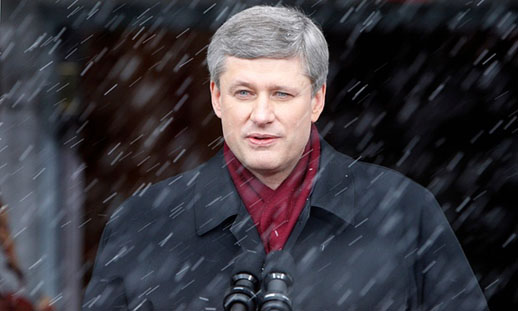
Davies goes on to call Harper a “master tactician” which reflects his “clever and harsh” character, who has turned the democratic process into a sequence of ugly political manoeuvres that hew closely to the philosophy of American political conspirator, himself a master manipulator, Arthur Finkelstein, a senior advisor to Richard Nixon and Ronald Reagan, and who has consulted on all five of Stephen Harper’s campaigns for office.
One of Harper’s allies in the 1990s, Gerry Nicholls, captured in his memoirs the special cynicism of Finkelstein’s will to manipulate the electorate in his dictum: “We have to convince Canadians to drink pig’s piss.”
How did Harper go about achieving this far from laudable goal?
Attack ads smearing the opposition, in 1993, a focus on Liberal leader Jean Chrétien’s facial disfigurement, caused by Bell’s palsy, and more recently exploiting “wedge” issues that aim to alienate a section of the opposition support, such as demanding the closure of the unit where heroin addicts in Vancouver may access safe injections, not to mention descending into old-fashioned, U.S.-style pork-barrel politics — as he did prior to the August 2nd election call — pouring public money into ridings that were politically important. A Globe and Mail investigation this year found that 83% of the Harper government’s new infrastructure projects had gone to the 52% of ridings that were in Conservative hands.
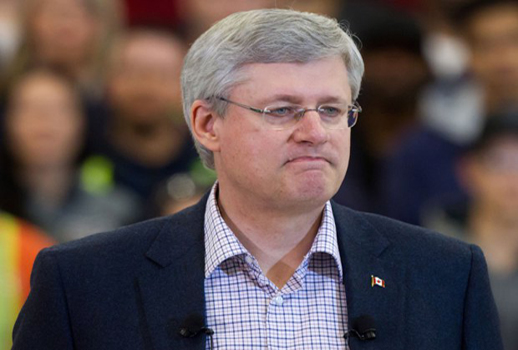
Once the election was called eleven weeks ago today, Stephen Harper — having stopped public funding for political parties, yielding the financial advantage to his corporate-funded Conservative party — the prime minister, when he made speeches or held photo ops avoided questions from the press, dragged out Canadian idol Wayne Gretzky — hardly a deep political thinker — to endorse the Conservative party, thereby garnering headlines and nightly television news hours coverage, microtargeted home owners with a tax break on home renovations, and when the party was slipping backwards in the polls, came up with a brilliantly successful wedge issue that devastated the New Democratic Party campaign — where Harper insisted that no Muslim woman should be allowed to take the oath of Canadian citizenship while wearing a niqab, appealing to “old stock” Canadians, who fear Muslim migrants as intruders, and liberal feminists, to whom one of Harper’s ministers appealed by describing the niqab as “a medieval tribal custom that treats women as property rather than people.”
For speaking up in favour of a Muslim woman’s right to choose what she wears, Tom Mulcair, the leader of the New Democratic party, was punished with a disastrous collapse in his poll ratings, while Harper surged upwards.
Davies concludes his article in The Guardian, writing …
“Harper has the natural advantage of an opposition, which is divided between Mulcair’s NDP and Justin Trudeau’s Liberals. He also has the advantage of what looks like a form of voter suppression which, unlike robocalls, is legal — a requirement that voters produce an official document in addition to their voter card to prove that they have a home in the riding.”
“Harry Neufeld, who has been running elections in Canada since 1982, said he estimated that at least 250,000 qualified electors would be denied a vote. These are likely to be people who would not vote Conservative — students, the poor, aboriginal people.”
“I believe the legal changes amount to systematic manipulation,” he said. “It saddens me to see this happening in Canada. It reduces the perceived integrity of our national elections. And it damages our reputation as a country with deep democratic values.”
Will Canadians elect Stephen Harper to a fourth consecutive term in office as Canada’s Prime Minister, a feat not achieved since the bygone days of Liberal prime minister Sir Wilfred Laurier, at the outset of the 20th century?
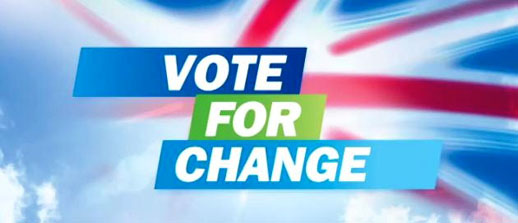
Only you can reject the politics of fear and division. Only you can say to Stephen Harper, “Enough is enough!” Tomorrow the polls open in British Columbia at 7 a.m., closing 12 hours later at 7 p.m. Get out and vote.
As we have suggested previously, consult with Éric Grenier’s threehundredeight.com, and make sure that you cast a ballot for the Liberal or NDP candidate in your riding who will best be able to defeat the Conservative candidate on the ballot, and put an end to heinous Canadian politics in the form of Stephen Harper.
On October 19th make your voice heard. Tell Harper, Enough is enough!